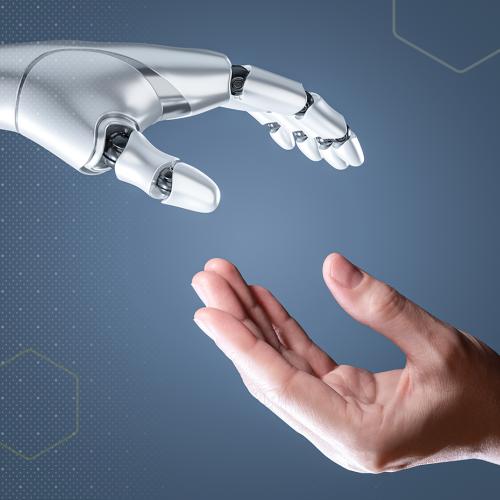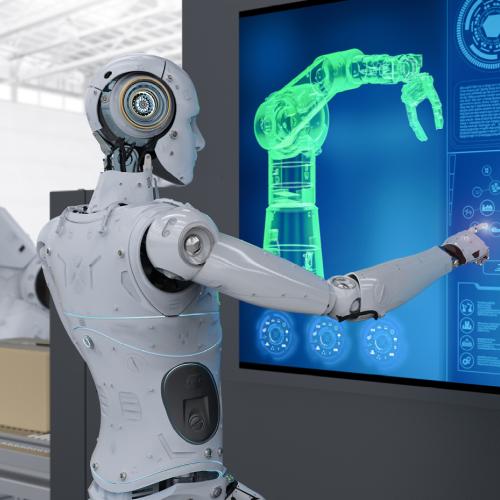Emerging Tech: The Human Side of Automation
How technology depends on human intelligence

Artificial intelligence continues to advance at an increasing pace, transforming the way we work and live. As computers and machines grow more and more capable of completing complex tasks and challenges, one question persists: What does the future of work look like, and where do humans fit into the picture?
THE FUTURE IS BRIGHT
As technology advances, it creates new challenges that need to be managed. The language model ChatGPT, for example, exemplifies AI’s capability for a wide range of generative tasks but still has a host of challenges like bias and accuracy, especially regarding world events after 2021. And with ChatGPT’s high confidence, these errors are often difficult to see, creating a need for human intelligence to verify and improve the AI model’s accuracy.
Advancing AI technology also creates opportunities by opening the door to new career paths, such as virtual assistant developers, and augmenting others by enabling greater human capability and productivity.
“Many jobs and careers are being reshaped as AI advances,” says Polo Chau, Associate Director of Master of Science in Analytics and instructor in the online program, “we will increasingly see AI prefixing more job titles such as 'AI-Empowered Physicians,' to indicate physicians who are thoughtfully leveraging AI when communicating health outcomes to patients to improve quality of care.”
While technological advancement often creates some significant economic shifts, this is not a new phenomenon, and so far, it hasn’t presented any cause for alarm. “Because new AI developments hit the market and change it so suddenly, it’s easy to feel like they’re going to cause existential disruption,” says David Joyner, executive director of online education and the Online Master of Science in Computer Science (OMSCS) at the College of Computing.
“But when we look back at other major developments, such as the personal computer, iPhone, and web development platforms, it’s evident that we continue to adapt and evolve with these changes.”
Since the 1990s, web development platforms have been on the rise, gradually making it easier for anyone to craft their own website. Today, the top four platforms—Wix, WordPress, Shopify, and SquareSpace—account for about 961 million websites on the internet, just over 50% of all websites. At the same time, web developer jobs, which require the same technical skills that these platforms supposedly replace, also continue to increase. The U.S. Bureau of Labor Statistics reported about 197,100 web developer positions in the U.S. in 2021 and predicts that the field will grow 23% between 2021 and 2031.
According to Joyner, this is a standard economic trend. “We go through a process of taking a niche and nuanced skill held only by a select few and making it more and more accessible to everyone, partially through access to tools and partially by making it more usable.”
Moreover, despite recent layoffs in the tech sector, work openings are still plentiful, and job seekers may find new opportunities in tech-adjacent sectors such as climate technology, finance and insurance, cybersecurity, aerospace and defense, and healthcare—all eager to hire skills in data science, software engineering, UX design, and more.
Job market shifts also create opportunities for startups, and Atlanta is a growing national hub for tech entrepreneurship. CDL-Atlanta and VentureLab, for example, are two startup incubators within Georgia Tech that have supported the creation of hundreds of startups. Atlanta Tech Village has also supported over 300 startups in Atlanta since its founding in 2002. Free from attachments to legacy technology, startups can adapt to the latest technology trends and gain an advantage over their mega competitors.
PURSUING A CAREER IN TECH
Despite automation’s increasing capabilities, it can’t do everything. We still need many skills in the tech field that only humans can provide, and these are the skills that anyone interested in a career in tech should consider developing.
Foundational knowledge in every field—such as math, computer science, and language—is essential to maintain and improve technology. While AI may be able to take over many of the technical tasks, we still need humans who can interpret.
“You may not need to manage the code,” says Chau, “but you need to know some of the core principles about the code to make effective observations, conclusions, and recommendations.”
Soft skills are vital to excel in managing and improving technology. According to research by the Stanford Research Institute and the Carnegie Mellon Foundation, 75% of long-term job success depends on soft skills, while only 25% depends on technical skills, and this is only becoming more relevant as automation grows in technical capability.
“There’s always going to be a need for people who can bring together and manage people and resources productively,” says Thad Starner, professor in Georgia Tech's School of Interactive Computing and OMSCS faculty member.
Human skills like critical thinking, curiosity, adaptability, and emotional intelligence will continue to be essential as automation becomes more abundant in the workplace.
Specifically, there is a growing need for professionals who can bring this human perspective into the design and function of AI technology—an area known as Human Computer Interaction (HCI).
“The best toolsets are not necessarily the ones that have the best tech,” Starner explains, “they’re the ones that have the best interfaces.”
As technology advances across all products, effective HCI is becoming increasingly important to set a product apart from its competitors.
FINDING YOUR WAY FORWARD
One of the best ways to build new skills for a quickly changing technology landscape is to seek a mentor in the field. Startup networking events offer great opportunities to build industry connections, and you can find several in the Atlanta area. By providing service or assistance to another professional with more experience, you can develop skills and gain direct exposure to a variety of industry trends and practices.
No matter what path you take, the most important factor to stay relevant in the field of automation is to keep learning and stay persistent. New technology is always around the corner.
“Whenever we complete a project or use a tool, there’s always something new we can learn,” Chau says. “Work always offers the opportunity for growth. When we not only do the work but also learn—that is what pays off in the long run.”
Credits
Written by: Rachel Meyer

